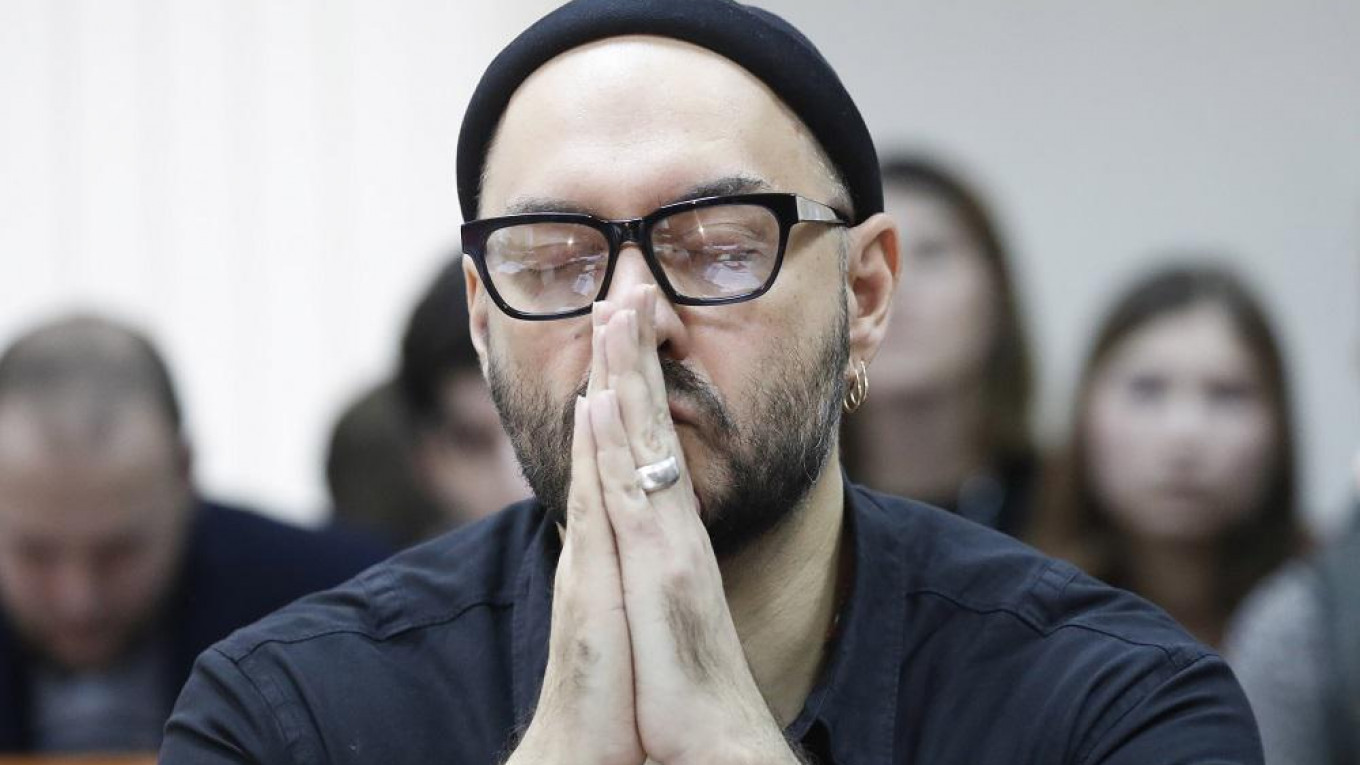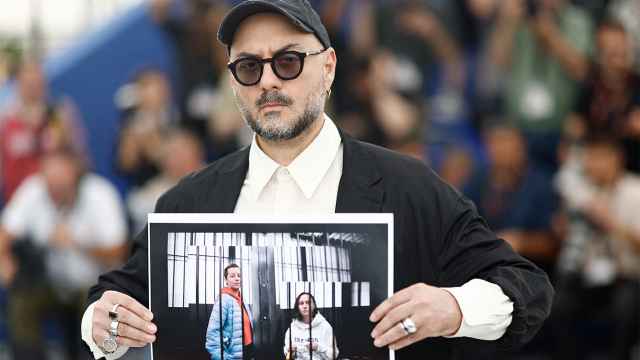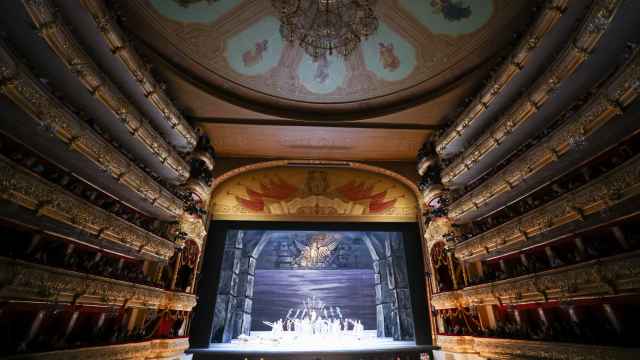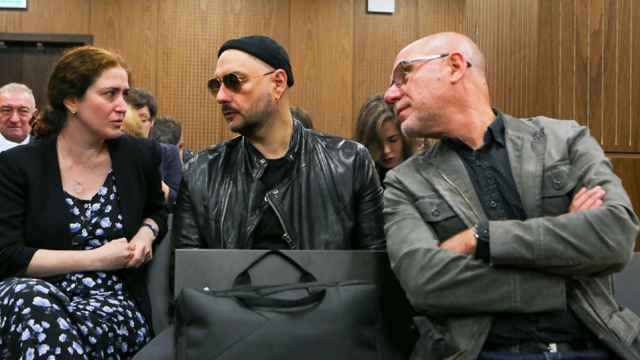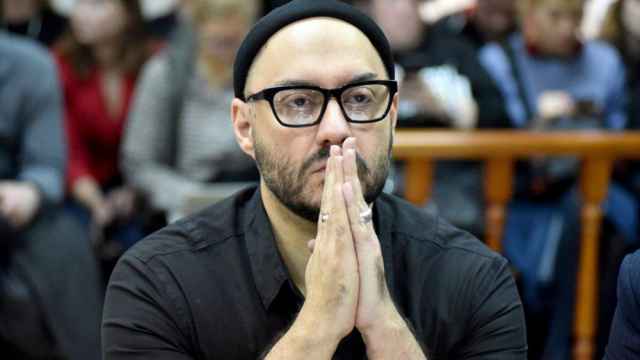It would be impossible to think of culture and art in 2018 without bearing in mind the case against Kirill Serebrennikov, which casts a shadow over the entire artistic community.
The December premiere of his “Nureyev” ballet at the Bolshoi Theater was a social event without precedent.
The audience was a veritable “who’s who” of the Russian elite: Oligarchs, government officials, relatives of former President Boris Yeltsin and President Vladimir Putin’s closest associates. It was as if everyone but Putin himself was in attendance.
The whole thing was reminiscent of a time when the Bolshoi Theater symbolized the country’s imperial grandeur and members of the imperial family — or, later, Communist Party officials — regularly appeared in the loges.
In the old days, however, it would have been unimaginable for the director of the show to be under house arrest on the day of the premiere, for the performers to make their curtain calls in T-shirts with slogans in support of their embattled colleague or for government officials in the audience to applaud the show of solidarity.
Serebrennikov’s case embodies the new conflict between the Russian state and the creative elite. In December, both sides of that conflict met in the same theater as if nothing had happened. That in itself was a piece of theater — a theater of the absurd.
It is already possible to predict with absolute certainty that the main cultural events of 2018 will also be connected to the Serebrennikov case. They will be played out not on stage, but in the courtroom.
Even now, before investigators have finished their work, the case is beginning to look like one of the iconic trials of the Putin era, that against Yukos CEO Mikhail Khodorkovsky.
Back then, the jailing of Khodorkovsky established new rules for how business is done in Russia. Similarly, the recent trial of former Economic Development Minister Alexei Ulyukayev defined what is off-limits to government officials. In the same way, the future trial of Serebrennikov and his colleagues will reshape relations between the state and the creative elite.
The show trials of the Stalin era are often compared with dramas in which the prosecutors, lawyers, and defendants seemed to act out scripted roles and repeat lines that have been written by some unknown playwright.
In the Putin era, the words spoken in a courtroom are almost inconsequential: The prosecutor can level absurd charges to which the defendant has the right to object. But everyone understands that the plot was written beforehand and the outcome is predetermined.
Not the details of the case but the message it sends to the public are important. And that message is never written out: It is left up to the witnesses and associates of the accused to figure out its meaning.
Serebrennikov’s colleagues understand that the formal accusation that he embezzled state funds is only a cover for some other complaint the authorities have against him and all the defense arguments in the world will not change the verdict in his trial.
Whatever its outcome, the message is also clear, namely that the state agrees to finance cultural institutions and pay creative people for their work, but in return demands absolute loyalty.
What is loyalty in this context?
It does not mean that artists have to vote for Putin or glorify Russia in their productions. Loyalty in 2018 has no connection whatsoever to ideology. This new form of loyalty demands that cultural figures make no public statements or actions that would distance them in any way from the system or suggest that they are critical of it.
Each individual must try to figure out what is acceptable and what is not. One performer might refuse to take part in an international festival held abroad. Another might simply refuse to discuss politics during an interview.
A theater manager might avoid working with a director who is known for making bold aesthetic choices or political statements.
In today’s Russia, the authorities do not engage in direct censorship: They create an environment in which cultural figures feel compelled to censor themselves.
As a result, artists spend less time and energy thinking about creativity than they do about how to avoid accidentally overstepping the extremely indistinct line of political propriety. Because, although the rules might be hazy, the punishment for violating them most definitely is not.
Yes, the situation has truly become a theater of the absurd.
Yury Saprykin is a prominent journalist and culturologist. The views and opinions expressed in opinion pieces do not necessarily reflect the position of The Moscow Times.
A Message from The Moscow Times:
Dear readers,
We are facing unprecedented challenges. Russia's Prosecutor General's Office has designated The Moscow Times as an "undesirable" organization, criminalizing our work and putting our staff at risk of prosecution. This follows our earlier unjust labeling as a "foreign agent."
These actions are direct attempts to silence independent journalism in Russia. The authorities claim our work "discredits the decisions of the Russian leadership." We see things differently: we strive to provide accurate, unbiased reporting on Russia.
We, the journalists of The Moscow Times, refuse to be silenced. But to continue our work, we need your help.
Your support, no matter how small, makes a world of difference. If you can, please support us monthly starting from just $2. It's quick to set up, and every contribution makes a significant impact.
By supporting The Moscow Times, you're defending open, independent journalism in the face of repression. Thank you for standing with us.
Remind me later.



